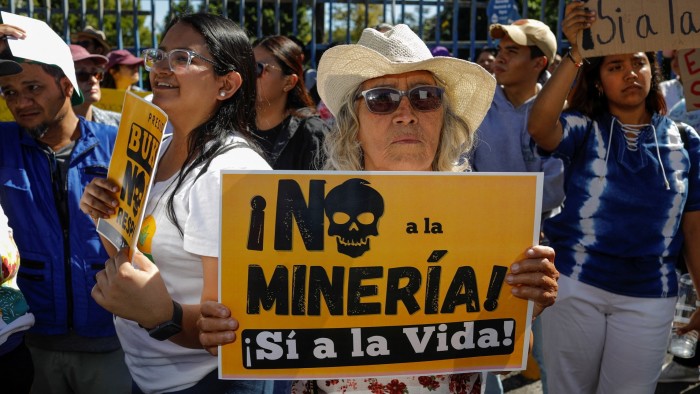Unlock the Editor’s Digest for free
Roula Khalaf, Editor of the FT, selects her favourite stories in this weekly newsletter.
El Salvador’s congress overturned a blanket ban on metal mining in a bid to find new sources of economic growth, handing a win to President Nayib Bukele despite criticism over the measure from environmental and religious groups.
The ban, which was the first of its kind in the world, was introduced in 2017 to protect the country’s water resources. Bukele, who came to power in 2019, described it as “absurd”.
Bukele’s party and its allies hold 57 of 60 seats in the legislature, and all 57 voted to overturn the ban while giving the Salvadoran government sole authority over mining activities.
In his second term, Bukele — one of the region’s most popular, if controversial, leaders — has focused on reviving El Salvador’s economy and seeking foreign investment. He has claimed that El Salvador sits on gold reserves potentially worth $3tn, citing an undisclosed study, although that has been treated with scepticism by experts.
There has been limited exploration in El Salvador. El Dorado, the most advanced of more than two dozen exploration projects prior to the ban, was once estimated to hold 1.4mn ounces of gold, which would be worth roughly $3.6bn today, without considering production expenses.
El Salvador’s gold belt runs across its northern provinces and the watershed of the Lempa River, which is the small and densely populated country’s main source of water.
Concern over the water needs of mining and the potential pollution from cyanide, a toxic substance frequently used in gold mining, moved civil society to demand a 10-year moratorium on mining in 2007, which was followed by the ban.
The Catholic Church, a central actor in the 2017 ban, made a public appeal for it not to be overturned.
One recent national poll found that 59.2 per cent thought mining was not appropriate for El Salvador, while 23 per cent thought it was.
Bukele said the mining would be “modern and sustainable”, and the gold would “transform El Salvador”.
The price of gold has surged to more than $2,600 per ounce, hitting an all-time high in October.
During his first term, Bukele launched a crackdown on gangs, using emergency powers to jail 82,000 suspects without trial. The murder rate collapsed and Bukele’s popularity soared.
He was reelected with 85 per cent of the vote in February, following a court decision that paved the way for him to run again even though some legal experts argued that re-election was prohibited under the country’s constitution.
El Salvador recently reached a deal with the IMF for a $1.4bn loan, having agreed to reduce its budget deficit and shore up international reserves. Under the deal the country agreed to make it voluntary for the private sector to accept bitcoin.



